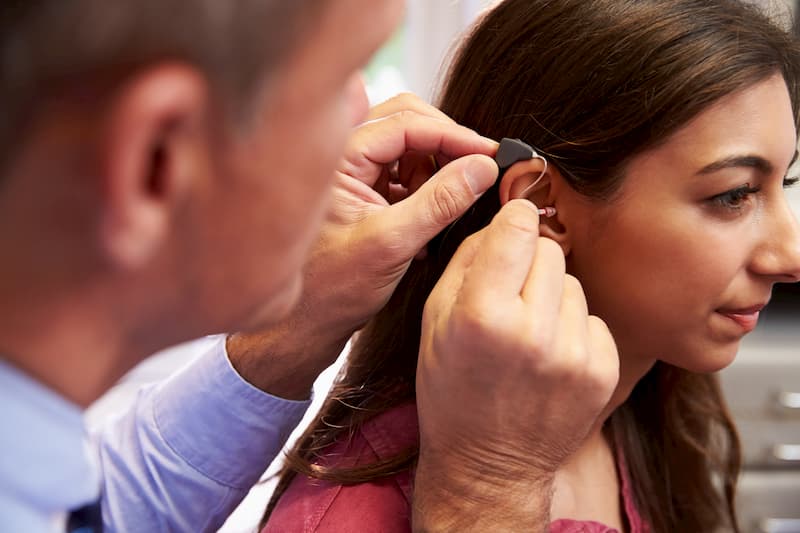We all know that hearing loss occurs and can affect us when exposed to dangerously loud sounds, or simply as part of the aging process. ‘What are hearing aids‘ is a question most of us feel we know the answer to and seeing someone with a hearing aid is not an unusual sight, however, there are also a lot of misconceptions about the facts and science behind hearing loss and the field of audiology in general. Get in the know by dispelling these five myths about hearing aids.
Hearing Aid Myths That are Wrong
Here are five of the most commonly misunderstood areas of audiology and hearing aids.
#1 All Hearing Aids Are The Same
Hearing aids differ both in their appearance and function, as not all hearing loss is the same. A modern hearing aid is a complicated adjustable device that will perform differently depending on how it has been programmed. That is why it is essential to be correctly fitted and tested for your hearing aid by your Houston audiologist to make sure it is performing optimally for you. Hearing aids also vary in their quality, consequently affecting their price, so sometimes getting the “best deal” on the market doesn’t mean you will actually get a quality product. A more premium technology will actually do a better job of filtering out the background noise over the speech so that you can decipher conversation even in a more difficult listening environment. Did you know specific problem sounds can be pinpointed and corrected? If your hearing loss only affects certain sounds, it is still possible the right hearing aid can help you by selectively addressing the difficulty you have hearing those particular sounds.
#2 Hearing Aids Always Look Obvious and Clumsy
The old clunky hearing aid that constantly malfunctions and emits loud, high-pitched sounds (known as “feedback”) is something of a cliché that has little place these days outside of old-time TV shows. Hearing aids have come a long way, though the more classic over-the-ear style is still available and has some advantages. But if you prefer a hearing aid that is more discreet, custom-fitted in-the-ear models are also available. Whatever your preference, there is a solution for you. Hearing aids do need to be taken care of and occasionally may need parts replaced, which is why working with a reputable audiology clinic is a very good idea.
#3 Only One Ear Ever Needs a Hearing Aid
People often think hearing loss only occurs in one ear, not both, and that only one hearing aid is needed. This is likely because hearing loss is often more pronounced in one ear, so people don’t notice that the other one is affected too. But if you think about it, loud noises that may have damaged your hearing will have affected both ears, and age-related changes could well affect both ears. In fact, if we see that you have one ear that is significantly different from the other ear, we may recommend further testing in case there are any other issues going on. The key is that if there’s any amount of loss that is aidable, both ears should be aided, otherwise you will still have issues in background noise amongst other things. That’s why your Houston audiologist will make sure both are checked out and evaluated properly.
#4 Hearing Aids Return Your Hearing Optimal Capacity
Your hearing is very complex, and when hearing is lost, you cannot assume a device will restore it to exactly what it was before. Another part of this is that hearing is not just a mechanical process, but also involves how your brain processes information. Therefore, your hearing will change as your brain adjusts to any changes, including getting hearing aids. This is why follow-ups are essential, as you may not notice a specific issue at first, but later, as you become more finely attuned to the sounds your hearing aids are transmitting, you can pinpoint finer problems which can then be corrected through adjustment.
#5 Hearing Aids Are Only For The Elderly
It’s true that hearing loss frequently develops progressively as we age, which is why hearing aids are more common amongst the elderly population. But hearing can be damaged at any age, especially when repeatedly exposed to harmful noise levels. If you are concerned you may be experiencing hearing loss; you should get it checked out whatever your age. At the minimum, you can have a baseline of your hearing, that way if/when something changes further in the future, you have something to compare it to.
Contact an Audiologist Today with Your Hearing Questions
If you have concerns about hearing loss, your local Houston hearing specialist at Memorial Hearing is here to help, so contact us today to schedule an appointment.
_______
Image Credit: Getty/ monkeybusinessimages

